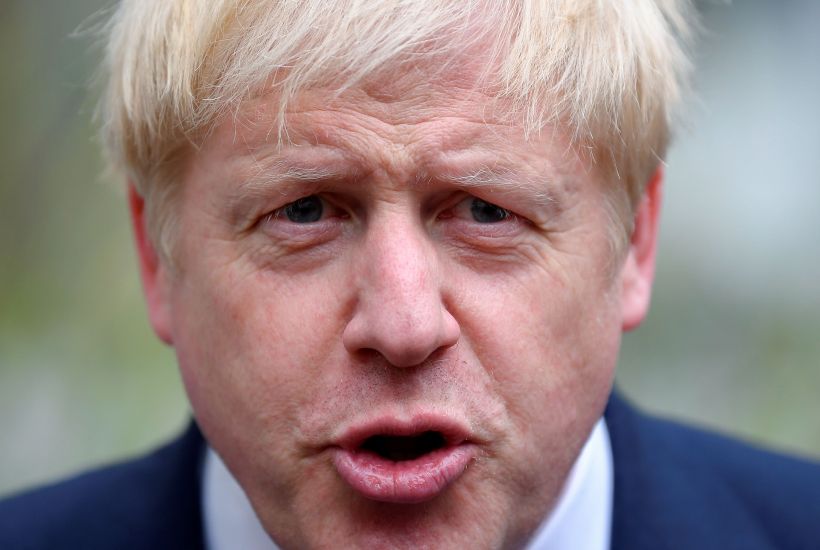As was to be expected, the EU’s reaction to Boris Johnson’s offer of revisiting the Withdrawal Agreement if the backstop is removed has been to reject it out of hand. But there are still 68 days to go before the UK is due to leave the EU and if the EU’s resolve wavers between now and then, Boris’s high-risk strategy could come back to haunt him.
Reading Martin Howe’s evisceration of the Withdrawal Agreement, one is reminded of Jerome K Jerome’s visit to the doctor in Three Men in a Boat. Rather than explaining that he was suffering from the symptoms of pretty much every disease known to mankind, J found it easier to tell his doctor the one thing that was not wrong with him: housemaid’s knee.
It is similarly hard to find anything good in Theresa May’s ‘deal’, with or without the backstop. It would tie the UK to EU rules and regulations for perhaps two more years. It would mean the UK is subject to rulings from the European Court of Justice. It would hand over trade policy with no democratic accountability. Even worse, the UK would give some £30bn of taxpayers’ money without getting any agreement over the long-term trading relationship. Perhaps the only thing to be said for the Agreement is that it has managed to unify Brexiteers and Remainers, albeit in strident opposition to the deal. Any PM signing the UK up to such a deal would likely be harshly judged by history.
An alternative strategy would have been for Boris to declare the Withdrawal Agreement dead and offer the EU specific agreements on a take-it-or-leave-it basis, such as continued tariff-free trade and mutual product standard regulation, perhaps even accompanied by some money as a goodwill exit gesture.
The EU might still have rejected such an offer, but Boris could have presented himself to his domestic audience as negotiating from strength rather than repeating Theresa May’s approach of travelling around Europe begging for concessions from Macron and Merkel.
Why then is Boris trying to resurrect the Withdrawal Agreement?
One possible explanation is that Boris is banking on the EU refusing his offer at every stage. Spinning out the negotiations over the Agreement might be enough to delay action by MPs to bring him down until it is too late to stop Brexit. He can then present himself as being the reasonable party and the subsequent no-deal exit on the 31 October being seen as the unfortunate but unavoidable result of EU intransigence. There is every reason to believe that the no-deal outcome for the UK will end up being far less painful than the desperate predictions being put forward in the media might suggest. As a result, once Brexit is delivered, Boris’s electoral chances will look very strong indeed.
It is not an impossible scenario. The EU have been so adamant that the Withdrawal Agreement cannot be changed that perhaps they have backed themselves into a corner.
And yet the EU still believes that the House of Commons may be able to thwart Boris’s Brexit plans. If they do, it makes sense for the EU not to give any ground at the moment.
But say we come to mid-October – with Boris somehow managing to survive the forthcoming parliamentary battles unscathed and our departure on the 31 October looking inevitable – the EU (and Ireland in particular) will then face a serious choice. If they accept Boris’s offer, they lose the backstop but keep control of UK trade and laws for two more years, as well as pocketing the £30bn ‘divorce bill’. If the EU continue to refuse to renegotiate, they still lose the backstop but they lose everything else as well.
Faced with such a choice, the EU Commission may well come under pressure from at least some member states to compromise and if they do, Boris could be in trouble. For a start, the parliamentary ratification process will cause yet another almighty row and deepen divisions within the Conservative party. But there is a good chance that a tweaked Withdrawal Agreement would get through parliament courtesy of Labour MPs in leave-leaning seats.
The trouble is that a good proportion of Brexiteer voters are utterly opposed to the Agreement in any form. As the fundamental problems with the WA reveal themselves over time to the broader public, it is Conservatives who will get the lion’s share of the blame. The European elections in May showed how vulnerable the Tory vote is to a squeeze from the Lib Dems on one side and the Brexit party on the other. Nigel Farage would be licking his lips at the prospect of fighting a general election in those circumstances. The outcome is unlikely to be pretty for Boris.
The EU accepting the PM’s offer is the nightmare scenario for him. But perhaps the EU will end up preferring no-deal to any compromise. They might calculate that anything else will not send out a strong enough warning to deter other countries from leaving. Or perhaps EU bureaucrats will simply not countenance losing face by giving in on the backstop.
If so, the UK will leave the EU with a clean break on the 31 October and the Brexit party’s threat to the Tories will be shot.
Boris’s gamble might well pay off for him in the end, but relying on your negotiating opponents to reject a proposal that is obviously favourable to them is a very risky strategy.
David Paton is professor of industrial economics at Nottingham University. He is a member of Economists for Free Trade and tweets at @cricketwyvern
Got something to add? Join the discussion and comment below.
Get 10 issues for just $10
Subscribe to The Spectator Australia today for the next 10 magazine issues, plus full online access, for just $10.




















Comments
Don't miss out
Join the conversation with other Spectator Australia readers. Subscribe to leave a comment.
SUBSCRIBEAlready a subscriber? Log in